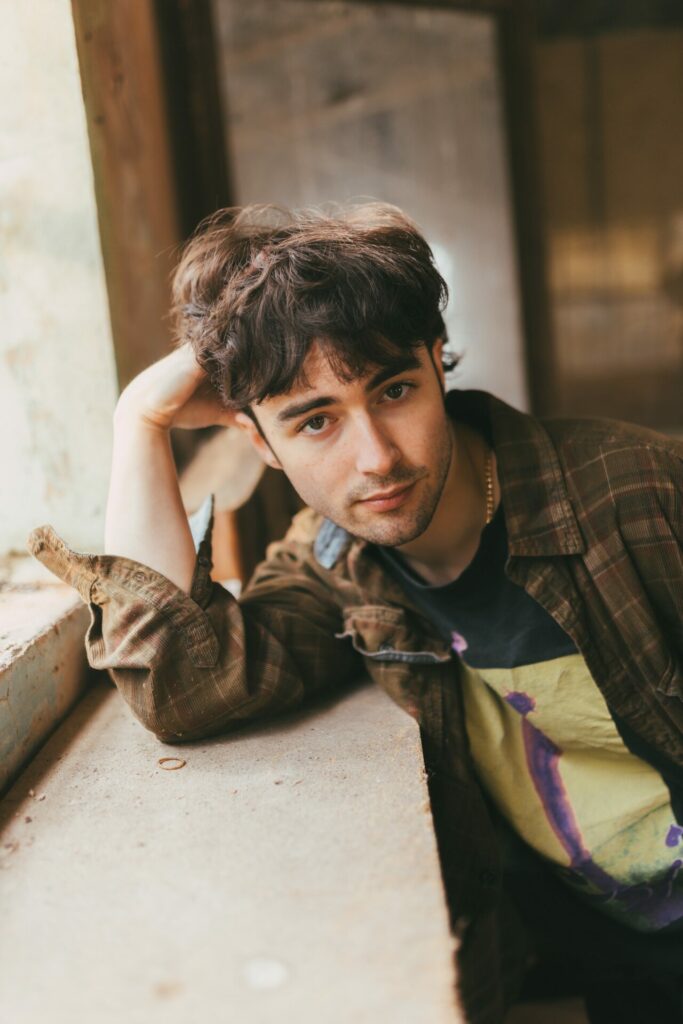Alfie Templeman’s fearless, funky new era
On second album ‘Radiosoul’, the songwriter works with Nile Rodgers and Dan Carey and channels Prince on an exuberant record celebrating new beginnings.

Alfie Templeman is very proud of his new beard. Meeting Rolling Stone UK in a north London café, the 21-year-old says that growing his new facial hair was also a symbolic move. “I definitely tried to grow it on purpose, so people stop talking about how young I am,” he laughs.
The prodigious songwriter has been making music in his Bedfordshire bedroom since he was 12, sharing self-released debut EP Wonderland Dreamin at 14. “When I started out, people would say, ‘Oh he makes really good music for his age’,” Templeman winces. “For his age. It’s the worst thing ever. Eventually you get older and think, ‘Am I still making good music? Has that worn off and was it just about the fact that I was young?”
New album Radiosoul sees this beard in all its glory on its cover, alongside rainbow colours shooting from Templeman’s ears. Both elements are representative of a mature, exuberant second album that recalibrates the singer as a funky partystarter and a great songwriter in his own right.
While debut album Mellow Moon was written entirely alone during the pandemic, work on Radiosoul began when Templeman was in the process of moving out of his parents’ house and to London with his partner. Album highlight ‘Beckham’ playfully details his struggles with London’s exhausting rental market, as he details all the neighbourhoods he tried to live in (“Sutton, Bexley, Tooting, Earlsfield, Streatham, Peckham”). He ended up living in none of them, but has now set up a new life in the capital that feels as representative of his move into adulthood as his new album.
After the pandemic lifted for most people, Templeman’s lung condition meant he had to isolate further, missing out on more pivotal teenage years. “Everyone was coming out of their shell, whereas I was waiting,” he recalls. “Things are about to change, and it’ll all be really amazing, but I can’t think about it too much. It was the same case with the album.”
As such, Radiosoul contains some of Templeman’s most anxious and downbeat lyrics, but offsets it with indie, R&B and neo-soul that bursts with life. “I was always into soul and Motown records, and I wanted to experiment with jazz chords,” he says. “Keeping it musically positive and optimistic is a good idea because there’s so much energy in the songs. Most of the time, I have to be in a pretty good mood to write the music. It’s all about the energy, spontaneity and capturing what feels good. For me, something feels good when it sounds positive, optimistic, energetic, vibrant.”
The varied sonic palette of the album also comes from Templeman working with outside producers for the first time. While Mellow Moon was produced entirely in his bedroom, here he teams up with Speedy Wunderground head honcho Dan Carey (“I really like the way that he’s very spontaneous, very live, just in the room”), Charlie Perry (a Jorja Smith collaborator who brought an R&B feel to the album) and Joe Scarborough (“He’s really good at the sad girl pop”).

During an interview with Clara Amfo on BBC Radio 1, Templeman then gained another high-profile collaborator after the presenter teased him that he was “basically ripping off Nile Rodgers”. He explains: “He heard the song somehow and invited me to hang at Abbey Road. I got a train from Bedford and met him there. We got a Nando’s. He had a black card but didn’t use it!” A year later, the pair reconvened in Miami to create the jubilant ‘Just A Dance’. “It’s got his wall of sound of guitars on it, and I felt very, very lucky to be able to do that.”
With the new album breaking Templeman out of any boxes he’d previously been placed in, he sees it as an opportunity to become an artist that thrives on unpredictability and cultivates a fanbase who appreciate these sonic and stylistic jumps.
“It’s a question of, ‘Do I do the same thing and make other people happy, or do I change and make myself happy?’ I don’t really want to be popular. I want to have a collective of fans that like that they don’t know what I’m going to do next. The people and musicians that I respect most have done that.”
He adds: “I’m putting music out under my own name, so as selfish as it is, I’m gonna do things for my own good. I’m gonna do things for Alfie Templeman.”
